
Imagine a symphony where each instrument has a vital part to play. In the agricultural orchestra, emus hold a unique role akin to the conductor, orchestrating harmony between nature and cultivation. Their presence goes beyond mere observation; they actively participate in the symphony of farming, influencing the dynamics of ecosystems and yields in ways you might not have considered. Stay tuned to uncover the subtle yet powerful contributions emus make to the agricultural landscape, painting a picture of sustainable coexistence and mutual benefit.
Key Takeaways
- Emus aid in natural pest control, targeting specific pests like grasshoppers and beetles.
- They contribute to land management by controlling vegetation growth, aiding soil aeration, and preventing erosion.
- Emus promote sustainable farming with efficient feed conversion and low environmental impact.
- Their oil is valuable in cosmetics and pharmaceuticals due to its anti-inflammatory properties.
- Emus enhance ecosystem diversity by controlling plant growth, aiding seed dispersal, and contributing to soil health.
Emus: Natural Pest Controllers
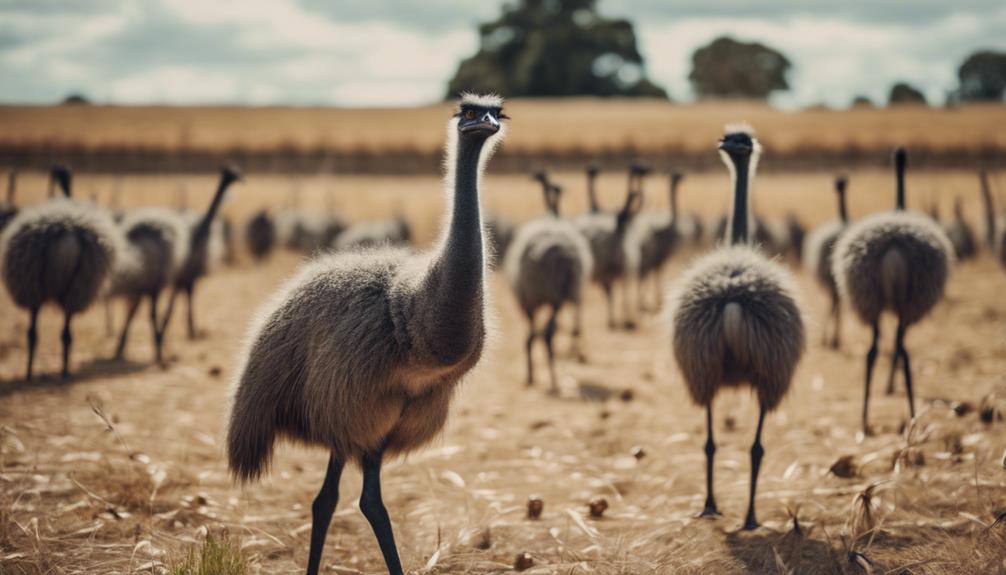
Emus actively control pests in agricultural settings by consuming insects and small rodents, contributing to a reduction in crop damage and the need for chemical pesticides. These majestic birds play a crucial role in maintaining a balanced ecosystem within farmlands. Studies have shown that emus can consume a significant amount of insects daily, with an adult emu consuming up to 2 pounds of insects in a week. This voracious appetite for pests makes them a valuable asset in pest management strategies.
Furthermore, emus have been observed to target specific pests such as grasshoppers, beetles, and mice, which are known to cause substantial damage to crops. By preying on these pests, emus help farmers reduce economic losses and minimize the environmental impact of using chemical pesticides. The presence of emus in agricultural settings not only benefits crop yield but also promotes a more sustainable and eco-friendly approach to pest control. Emus, with their natural pest control abilities, provide a powerful and effective solution to pest management in agriculture.
Emus' Impact on Land Management
With their foraging habits and selective diet, emus play a significant role in shaping the landscape and ecosystem of agricultural areas. Emus are known to feed on a variety of plants, fruits, and insects, influencing vegetation growth and pest populations. Their impact on land management can be observed through their grazing patterns and interactions with vegetation.
| Aspect | Impact |
|---|---|
| Vegetation Control | Emus help control vegetation growth through selective grazing, preventing overgrowth in certain areas. |
| Pest Population | By consuming insects and small pests, emus assist in regulating pest populations naturally. |
| Soil Aeration | Emus' movement across the land aids in soil aeration, enhancing nutrient absorption for plant growth. |
| Seed Dispersal | Through their droppings, emus aid in seed dispersal, contributing to the diversity of plant species in the ecosystem. |
| Erosion Prevention | Emus' foraging activities help reduce vegetation that can prevent erosion, thus aiding in soil conservation efforts. |
Emus' presence in agricultural environments can be leveraged to promote sustainable land management practices, benefiting both the ecosystem and agricultural productivity.
Emu Farming for Sustainable Meat
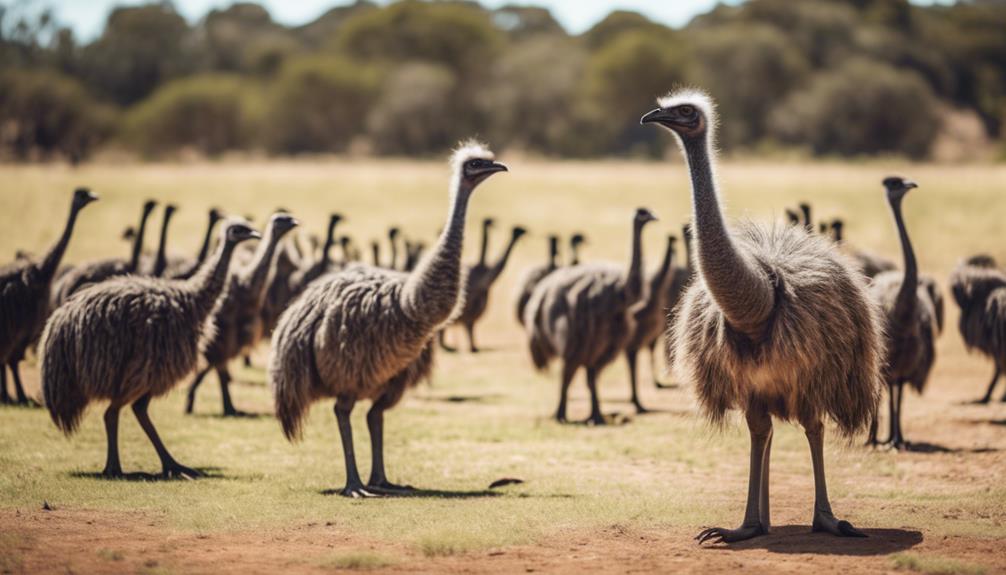
Frequent monitoring of emu farming practices reveals a sustainable approach to meat production that aligns with ecological and economic considerations. Emu farming for sustainable meat offers several key benefits:
- Efficient Feed Conversion: Emus require less feed compared to traditional livestock for meat production.
- Low Environmental Impact: Emus produce less methane and require less water, reducing their environmental footprint.
- High-Quality Meat: Emu meat is lean, low in cholesterol, and rich in iron and vitamin C.
- Profitability: Emu farming can be lucrative due to the high demand for lean, healthy meat products.
- Diversification: Emu farming provides farmers with the opportunity to diversify their agricultural activities, spreading risk and increasing resilience.
Emu farming for sustainable meat presents a promising avenue for agricultural development, offering a balance between profitability and environmental stewardship. By embracing this approach, farmers can contribute to both economic growth and ecological sustainability in the agricultural sector.
Emu Oil: A Valuable Byproduct
Utilizing advanced extraction methods, emu oil emerges as a valuable byproduct with diverse applications in various industries. Emu oil, rich in fatty acids like omega-3, omega-6, and omega-9, possesses anti-inflammatory and moisturizing properties that make it a sought-after ingredient in cosmetics and skincare products. Studies have shown that emu oil can aid in wound healing, reduce skin irritation, and improve overall skin health.
In addition to its uses in the beauty industry, emu oil is increasingly being utilized in the pharmaceutical sector for its potential anti-inflammatory and therapeutic effects. Research suggests that emu oil may help alleviate symptoms of conditions like arthritis and dermatitis.
Moreover, emu oil's composition closely resembles human skin oil, making it easily absorbable and non-comedogenic. This characteristic has led to its incorporation in hair care products, where it can help nourish and strengthen hair follicles. The versatility and beneficial properties of emu oil position it as a valuable commodity with a wide range of applications across various sectors.
Emus and Ecosystem Diversity
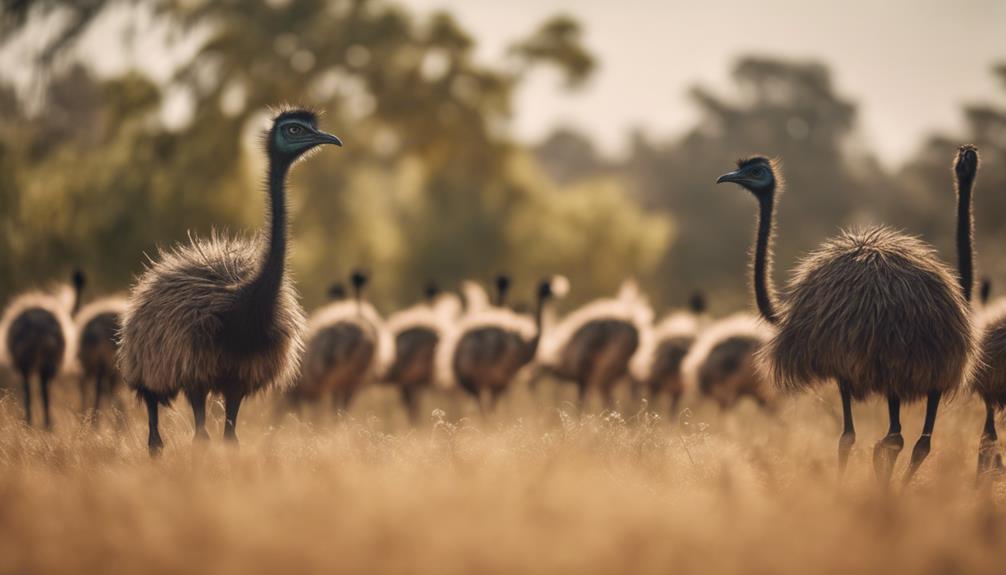
Emus play a crucial role in maintaining ecosystem diversity through their impact on vegetation and soil composition. These majestic birds contribute significantly to the overall health and resilience of various habitats.
- Emus help control plant growth by consuming a wide range of vegetation, preventing any single plant species from dominating the ecosystem.
- Their foraging behavior promotes the spread of seeds across different areas, aiding in the regeneration of plant populations.
- Emus aid in soil aeration through their constant movement and scratching, which enhances nutrient cycling and microbial activity in the soil.
- By creating small disturbances in the soil while foraging, emus contribute to the formation of microhabitats for a diverse range of organisms.
- The presence of emus in an ecosystem can lead to increased biodiversity, as their actions create niches for other species to thrive.
Emus: Low-Impact Grazers
An essential aspect of emus' role in agriculture lies in their ability to graze lightly, contributing to sustainable land management practices. Emus, as low-impact grazers, play a significant role in maintaining the health of pastures while minimizing environmental damage. Let's delve into the data to understand the impact of emus as grazers:
| Grazing Behavior | Environmental Impact | Efficiency |
|---|---|---|
| Light Grazers | Low soil compaction | Optimal foraging |
| Selective feeders | Biodiversity support | Minimal wastage |
| Rotational grazing | Weed control | Natural fertilizers |
Emus' unique grazing behavior not only helps prevent soil compaction but also supports biodiversity by selectively feeding and controlling weeds. Their rotational grazing patterns ensure that pastures are efficiently utilized, minimizing wastage and providing natural fertilizers. By incorporating emus as low-impact grazers, agricultural practices can benefit from sustainable land management techniques that promote both productivity and environmental stewardship.
Emus in Drought-Resistant Agriculture
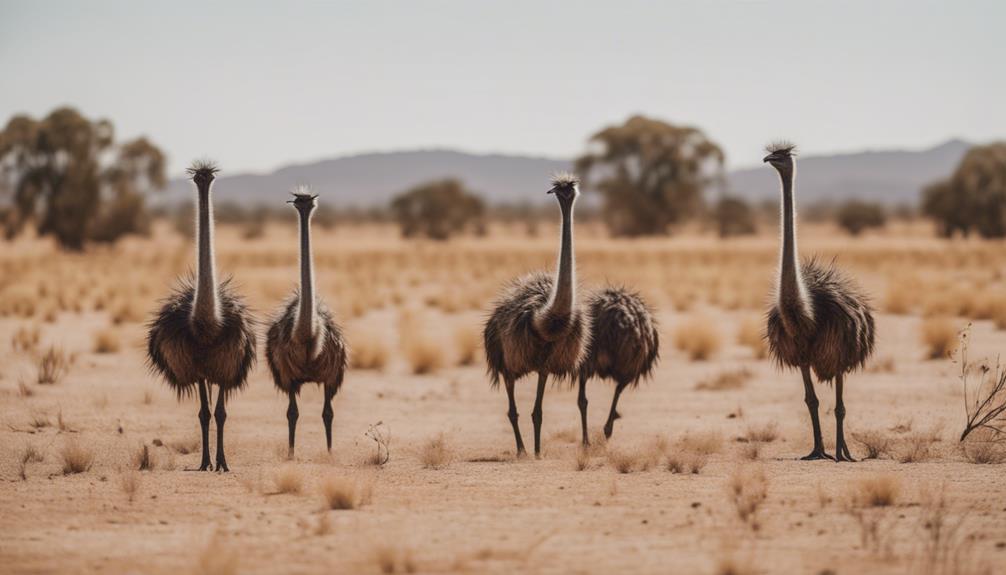
In enhancing agricultural resilience to drought, emus play a crucial role through their unique grazing behaviors and adaptability to arid conditions. Emus have shown remarkable abilities to thrive in harsh environments with limited water sources, making them valuable assets in drought-resistant agriculture practices.
- Efficient Water Usage: Emus are highly efficient in their water consumption, requiring significantly less water compared to traditional livestock.
- Drought-Tolerant Feeding Habits: Emus can survive on a variety of vegetation, including drought-resistant plants, reducing the need for supplemental feeding during dry periods.
- Minimal Impact on Ecosystem: Their light grazing habits help preserve vegetation and soil structure, contributing to sustainable land management practices.
- Natural Pest Control: Emus feed on insects and pests that can damage crops, offering a natural pest control solution without the need for chemical interventions.
- Adaptability to Arid Environments: Emus have evolved to withstand arid conditions, making them well-suited for agricultural regions prone to drought.
Integrating emus into agricultural systems can boost resilience against drought while promoting sustainable farming practices.
Emus Vs. Traditional Livestock
Comparing the efficiency and impact of emus versus traditional livestock in agricultural systems reveals significant differences in resource utilization and environmental sustainability. Emus, known for their ability to thrive in arid conditions, require less water compared to traditional livestock like cattle or sheep. This reduced water consumption translates to lower resource input for emus, making them more efficient in water usage.
Furthermore, emus produce lean meat that's high in protein and low in fat, appealing to health-conscious consumers. In contrast, traditional livestock often require more land for grazing and produce higher levels of greenhouse gases, contributing to environmental degradation.
From a sustainability standpoint, emus offer a more environmentally friendly option for agricultural practices due to their lower environmental impact. Their ability to adapt to harsh conditions and their efficient resource utilization make them a viable alternative to traditional livestock in certain farming systems.
Emus: Eco-Friendly Farming Partners
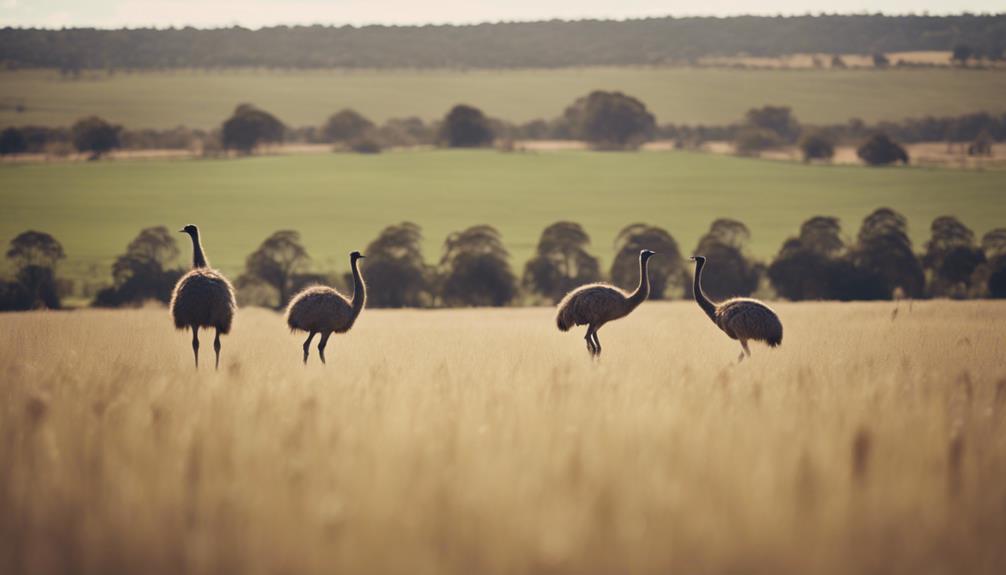
How do emus contribute to eco-friendly farming practices?
Emus play a vital role in promoting sustainable and environmentally conscious agricultural methods.
Here are five key ways in which emus serve as eco-friendly farming partners:
- Efficient Feed Conversion: Emus are highly efficient at converting feed into body mass, requiring less food compared to traditional livestock.
- Low Methane Emissions: Emus produce significantly lower methane emissions compared to cattle, reducing the greenhouse gas impact of farming operations.
- Minimal Water Usage: Emus have lower water requirements than many other livestock animals, making them a more sustainable choice in water-stressed regions.
- Natural Pest Control: Emus help control pests on farms by consuming insects and small rodents, reducing the need for chemical pesticides.
- Minimal Land Impact: Emus have a smaller environmental footprint in terms of land use compared to larger livestock species, allowing for more efficient land utilization.
Emus' Resilience in Extreme Climates
Emus demonstrate remarkable adaptability to harsh climates, showcasing their resilience in challenging environmental conditions. These birds have evolved mechanisms to thrive in extreme weather, withstanding temperatures ranging from scorching heat to freezing cold. Emus' ability to regulate their body temperature by modifying blood flow and adjusting their metabolic rate enables them to endure harsh conditions that would be detrimental to many other species. Research has shown that emus can survive in environments with temperatures exceeding 120°F (49°C) during the day and dropping below freezing at night, highlighting their impressive resilience.
Furthermore, emus' unique physiological features, such as their reduced feather coverage and efficient cooling systems, contribute to their success in extreme climates. These adaptations help them conserve energy and stay cool in hot weather while preserving warmth in cold conditions. Emus' remarkable resilience in facing such environmental challenges makes them valuable assets in agricultural settings prone to fluctuating weather patterns.
Emus: Minimal Environmental Footprint
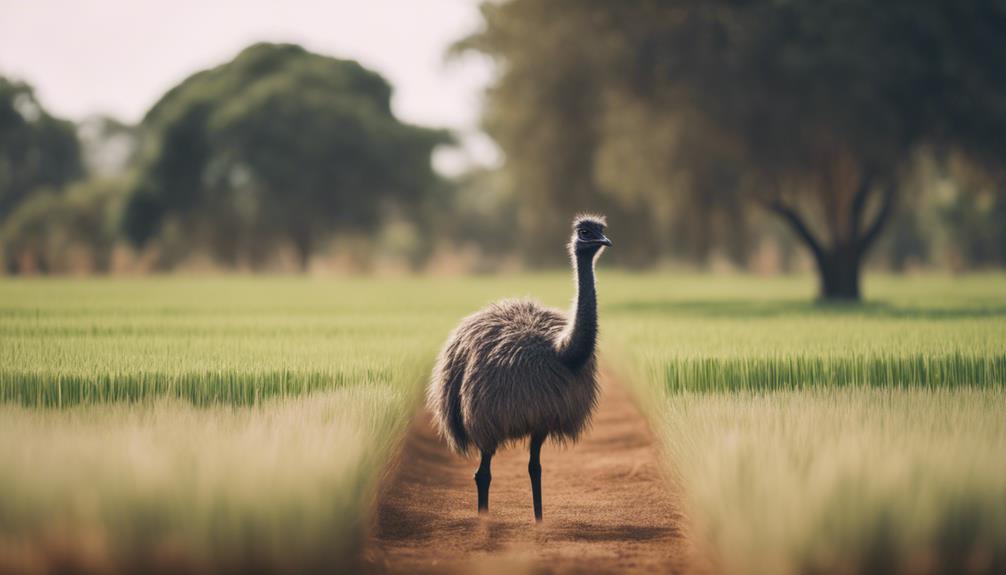
Emus' ability to thrive in extreme climates naturally translates into a minimal environmental footprint in agricultural practices. These large flightless birds have several characteristics that contribute to their low impact on the environment:
- Emus have a low water consumption rate compared to other livestock animals, making them efficient in water usage.
- Their omnivorous diet allows them to forage on a wide variety of plants, reducing the need for additional feed inputs.
- Emus produce nitrogen-rich waste that acts as a natural fertilizer, promoting soil health and reducing the need for synthetic fertilizers.
- Due to their resilience to harsh climates, emus require minimal shelter and heating, decreasing energy consumption on farms.
- Emus have a long lifespan and high reproductive rate, leading to sustainable breeding practices and a consistent supply of products without straining the environment.
Emu Products in the Market
Emu-derived products exhibit a growing presence and diverse range in today's agricultural market, reflecting the versatility and potential of these resources. Emu oil, known for its anti-inflammatory properties and high levels of omega fatty acids, is increasingly utilized in cosmetics, pharmaceuticals, and dietary supplements. The demand for emu meat is also on the rise, with its low-fat content and high protein making it an attractive option for health-conscious consumers. In addition, emu feathers are sought after for various crafts and decorative purposes, further expanding the market for these unique products.
Data shows a steady increase in the sales of emu-derived goods, indicating a growing interest in the benefits they offer. The global emu oil market alone is projected to reach $176.4 million by 2026, driven by consumer awareness of its therapeutic properties. As agricultural practices continue to evolve, the diverse range of emu products presents opportunities for farmers to diversify their income streams and cater to a market increasingly focused on natural, sustainable resources.
Frequently Asked Questions
Are Emus Aggressive Towards Humans or Other Animals?
Emus can be aggressive towards humans or other animals. They may exhibit defensive behavior if they feel threatened or cornered. Understanding their body language and maintaining a safe distance is crucial for avoiding potential conflicts.
How Do Emus Contribute to Soil Health?
By aerating the soil with their inquisitive beaks and enriching it through their droppings, emus bolster soil health. Their natural behaviors enhance soil quality, fostering an environment conducive to robust agricultural productivity and sustainability.
What Are the Challenges in Raising Emus for Meat Production?
Raising emus for meat production presents challenges such as high initial investment costs, limited market demand, and strict regulations. Success hinges on strategic planning, efficient operations, and a deep understanding of the industry landscape.
Can Emu Oil Be Used for Medicinal Purposes?
Investigate the potential benefits of emu oil for medicinal use. Studies suggest its anti-inflammatory and antioxidant properties. Embrace this natural remedy for skincare, pain relief, and wound healing. Harness the power of emu oil for wellness.
Are There Any Risks Associated With Introducing Emus Into New Ecosystems?
Introducing emus into new ecosystems can pose risks due to potential competition with native species, habitat alterations, and disease transmission. Careful planning and monitoring are essential to mitigate these risks effectively.
Conclusion
In conclusion, it's clear that emus play a crucial role in agriculture through natural pest control, land management, and sustainable farming practices. Their efficiency in feed conversion, high-quality meat, and valuable oil byproducts make them an eco-friendly and profitable asset for farmers.
Emus' resilience in extreme climates and minimal environmental footprint further highlight their importance in promoting sustainable agricultural practices. So next time you see an emu, remember, they're not just quirky birds – they're essential partners in farming success.




